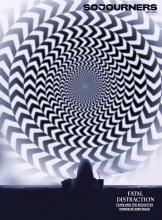Babylon

EVERYTHING EVERYWHERE ALL AT ONCE, the absurdist sci-fi cinematic romp through the multiverse by a Chinese American laundromat owner in the L.A. mega sprawl, garnered seven Oscars this year, including for Best Picture. I’ve seen Everything Everywhere eight times. I’ve introduced it to friends. I did not think my favorite film could do anything wrong. What could be better than to be wrapped up in the spectacle created by directors Daniel Kwan and Daniel Scheinert and their amazing cast?
The directors’ over-the-top approach embraces the “too muchness” of its title. Laundromat owner Evelyn Wang (Michelle Yeoh) lives with her husband, daughter, and recently-arrived-from-China elderly father in a small apartment above the family business. Their dining room is cluttered with the American dream — workout equipment, inspirational business books, beeping electronic kitchen gadgets, a TV droning in the background, and a live security feed to the washers and dryers downstairs. “The Daniels,” as the directors are known, wrote in the original script, “It is a still life of chaos.”
Evelyn and her family are slowly spinning apart, and now the IRS is auditing the Wangs and their business. The forces of chaos are spreading beyond their little apartment. Later, while Evelyn is explaining to an IRS auditor (Jamie Lee Curtis) why her receipts are not in order, she gets a message from her husband (well, an alternative version of him) that she may be in grave danger and that she may hold the key to saving not only her own world but also the worlds in multiple universes and parallel time frames.
Despite its zany premise and on-screen absurdities (from anthropomorphic racoons and talking rocks to people with hot dogs for hands), Everything Everywhere never lets the spectacle eclipse the emotional story at its center: Evelyn is learning to find contentment in her own universe with her real family, even if she has the power to be elsewhere all at once.

It’s always tempting to read without context, or to quickly presume our own. In which case this might yield a bumper sticker for urban ministry: Seek the Welfare of the City. Or some universal and individual dictum of God’s love.
But time and place are crucial to interpretation. This one, from the prophet Jeremiah, was penned in the reign of King Zedekiah, between the first Babylonian invasion of Jerusalem in 597 B.C.E. and the final destruction of Jerusalem and temple in 587, with a second deportation. It is a letter sent to the exiles by way of the king’s official couriers. The location of the letter is betwixt and between. Written in Jerusalem, read in Babylon. For that matter, kind of like our situation.
So, from where do we read? Equally crucial to know. William Stringfellow, in his An Ethic for Christians and Other Aliens in a Strange Land, put it like this:

VIOLENCE is the ethos of our times. It is the spirituality of the modern world. What is generally overlooked is that violence is accorded the status of a religion, demanding from its devotees an absolute obedience-unto-death.
Its followers are not aware that the devotion they pay to violence is a form of religious piety, however. Violence is so successful as a myth precisely because it does not appear to be mythic in the least. Violence simply appears to be the nature of things. It is what works. It seems inevitable, the last and, often, the first resort in conflicts. It is embraced with equal alacrity by people on the Left and the Right, by religious liberals as well as religious conservatives.

WHICH SCRIPTURES WILL our biases tempt us to sidestep this month? Perhaps 2 Timothy? Not usually the favorite of radicals. Whether actually written by Paul just before his death or worked up later by followers, the letter has a certain poignancy, suggesting the waning of Christianity’s pioneer phase. The church is in for the long haul. Its faith needs to find forms that can be transmitted across generations. It needs patient leadership that will be consistent in the face of inauthentic mutations of the gospel, religious imposters, and the distraction of futile controversies—hence the emphasis on sound teaching, the internalized treasure of the creed.
Let’s honor this recognition within scripture itself that the gospel needs institutions. The church must even risk banality in some of its teaching practices. A great interpreter of the Christian mystical tradition, Friedrich von Hügel, invites us to respect the way radical teachings have to be given forms that can be handled by regular folks, not geniuses. “Is there not a pathetic instruction in watching the insertion of the copper alloy into the pure gold ... that is, a metal sufficiently resistant to the clumsy handling of the multitude to be able to persist in the transmission of a value, and indeed a precise value, even though it be not the highest. There is surely a pathos here most thoroughly characteristic of the abiding limitations and homely needs of our poor humanity.”
"'The fruit for which your soul longed has gone from you, and all your dainties and your splendor are lost to you, never to be found again!' The merchants of these wares, who gained wealth from her, will stand far off, in fear of her torment, weeping and mourning aloud ..."
-- Revelation 18:14-15
Our current practice in the U.S. actually reflects the earlier legal reality of coverture: In the process of the "two becoming one flesh," the wife lost her rights to property, legal representation in court, and even her public identity as her husband became the sole representative for the family. This combination of identities (or, rather, the wife becoming lost in her husband's identity) led to wives taking their husbands' last names. For me, losing my surname would have represented silent assent to this oppressive practice.
This past weekend, Christians around the world celebrated one of our holiest holi-days: Pentecost. Pentecost, which means "50 days," is celebrated seven weeks after Easter (hence the 50), and marks the birthday of the Church, when the Holy Spirit is said to have fallen on the early Christian community like fire from the heavens. (For this reason, lots of Christians wear red and decorate in pyro-colors. This day is also where the fiery Pentecostal movement draws its name).
But what does Pentecost Sunday have to do with just another manic Monday?
What does a religious event a couple of thousand years old have to offer the contemporary, pluralistic, post-Christian world we live in? I'd say a whole lot. Here's why:
Let me start by confessing my bias. Not only am I a Christian, but I am a Christian who likes fire. I went to circus school and became a fire-swallowing, fire-breathing, torch-juggling-pyro-maniac as you'll see here. So naturally, I like Pentecost.
Social location is vital to understanding how people come to their interpretations, and appropriations, of the Bible and its stories.
